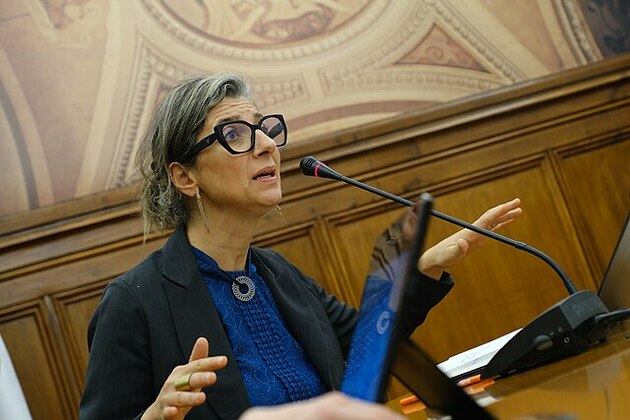Is the UK's energy storage growing fast enough?
The Conversation
01 May 2025, 15:28 GMT+10

Britain's booming green energy generation has a costly side-effect: the national electricity system operator has had to compensate wind turbine operators that could have produced more clean electricity than the grid could take.
The cost of paying windfarms to temporarily switch off rose significantly in early 2025, surpassing Pound 250 million in the first two months of the year. This figure not only includes these "constraint payments" to windfarm operators, but also payments to gas power plants to switch on and meet demand in the south of England that could theoretically be met by wind energy.
Wind power is often generated in remote areas like the Scottish Highlands, where there is low electricity demand. To transmit this power over long distances to areas of higher demand (mostly in the south of England) requires power lines, but these have transmission limits and there are not enough of them.
Britain will only make effective use of its energy potential if grid-scale energy storage keeps pace with the expansion of new windfarms and other forms of intermittent renewable energy, such as solar.
Large-scale battery systems, pumped hydro and other storage methods could capture the excess energy injected by windfarms on windy days and release it when needed. But are these energy storage options arriving quickly enough?
Most British consumers will not see a significant change in how they use electricity with the introduction of planned storage installations, other than fewer blips in power quality, such as flickering or dimming lights.
You might spot these new energy storage facilities in rows of what look like shipping containers but are actually batteries. And the national grid (which serves England, Wales and Scotland - Northern Ireland has a separate electricity network) will be more capable of responding quickly to even minor variations in electricity supply and demand, meaning fewer headlines about curtailed windfarms.
The UK government is aiming to build up to 27 gigawatts of battery storage by 2030 (in 2023, battery capacity was estimated to be around 5 gigawatts). There are applications totalling 59 gigawatts of battery storage in the connections queue for 2030.
Some of these are speculative - introduced to secure connection slots and permissions, with the intention of selling the rights on. These connections will not necessarily be built, yet contribute to long delays in approvals.
As a result, the energy regulator Ofgem has been working with network operators to reform the connections queue. This includes new rules and more coordination between grid operators and project developers, as well as incentives (such as lower connection charges) to encourage battery developers to ensure their output can be adjusted to accommodate network constraints when necessary.
Having substantial grid-scale energy storage could help stabilise electricity prices, which might give households lower and less volatile bills. It would also reduce the need to fire up gas generators during supply lulls, lowering the influence of expensive imported gas on electricity prices.
Storing excess renewable energy involves a range of technologies. Short-duration storage options such as batteries can supply energy ranging from seconds to a few hours. Long-duration storage, such as pumped hydro, can supply energy for several hours, days or more.
Pumped hydro is the oldest long-duration storage technology. It involves storing vast amounts of energy by pumping water to a higher reservoir when electricity is plentiful, and releasing it to a lower reservoir through a turbine when needed. Dinorwig in north Wales and Cruachan in western Scotland are capable of storing 9 and 7 gigawatt-hours of energy, respectively.
Major expansions are planned, such as the new pumped hydro storage scheme Coire Glas in Scotland. Expected to be completed around 2030-31, it is designed to store 30 gigawatt-hours, adding vast reserves of energy to the grid.
Britain's largest grid-scale battery installation, the Minety battery storage project completed in 2022 in Wiltshire, southern England, is capable of absorbing or delivering 150 megawatts - roughly equivalent to the power demand of 450,000 UK households.
While Britain is making progress with its storage infrastructure, other countries are scaling up rapidly. China has built huge pumped hydro stations and the US is deploying very large grid-scale batteries. Germany, meanwhile, is testing hydrogen storage to absorb the power from its onshore windfarms.
There is a drive by energy companies to develop new forms of long-duration storage. Along with hydrogen, liquidair storage is capable of inter-seasonal storage. This would allow solar energy collected during the summer to be available for release during the duller autumn and winter months.
In liquid-air plants, excess electricity is used to cool air to a liquid which can then be stored in insulated tanks. When electricity is required, the liquid air is heated and turned back into a gas, which moves a turbine and generates electricity. A 50-megawatt liquid-air plant planned near Manchester is expected to start commercial operation in 2026.
In hydrogen energy storage plants, surplus electricity powers an electrolyser that splits water molecules into hydrogen and oxygen. The hydrogen is stored and, when electricity is needed, fed into a fuel cell or turbine to generate the electricity. An example is the proposed Aldbrough facility in east Yorkshire, which is expected to be in operation by 2030 and will have a storage capacity of 320 gigawatt-hours. This facility will use three repurposed salt caverns originally developed to store natural gas.
Energy storage technology has become a serious business opportunity, with companies investing billions of pounds into building new facilities. The variety of projects in the pipeline suggests the UK will be better able to avoid curtailing wind energy in the future, even accounting for growth in wind power capacity. Paying windfarm operators to switch off may soon be a thing of the past.
Don't have time to read about climate change as much as you'd like?
Get a weekly roundup in your inbox instead. Every Wednesday, The Conversation's environment editor writes Imagine, a short email that goes a little deeper into just one climate issue. Join the 45,000+ readers who've subscribed so far.
 Share
Share
 Tweet
Tweet
 Share
Share
 Flip
Flip
 Email
Email
Watch latest videos
Subscribe and Follow
Get a daily dose of Scotland Star news through our daily email, its complimentary and keeps you fully up to date with world and business news as well.
News RELEASES
Publish news of your business, community or sports group, personnel appointments, major event and more by submitting a news release to Scotland Star.
More InformationUK
SectionPersson family steps up H&M share purchases, sparks buyout talk
LONDON/STOCKHOLM: The Persson family is ramping up its investment in the H&M fashion empire, fueling renewed speculation about a potential...
L'Oreal to buy Color Wow, boosts premium haircare portfolio
PARIS, France: L'Oréal is making a fresh play in the booming premium haircare segment with a new acquisition. The French beauty conglomerate...
UK lawmakers desigate protest group as terrorist organization
LONDON, UK - Lawmakers in the United Kingdom have voted overwhelmingly to proscribe the direct-action group Palestine Action as a terrorist...
New French law targets smoking near schools, public spaces
PARIS, France: France is taking stronger steps to reduce smoking. A new health rule announced on Saturday will soon ban smoking in...
COVID-19 source still unknown, says WHO panel
]LONDON, U.K.: A World Health Organization (WHO) expert group investigating the origins of the COVID-19 pandemic released its final...
Shell rejects claim of early merger talks with BP
LONDON, U.K.: British oil giant Shell has denied reports that it is in talks to acquire rival oil company BP. The Wall Street Journal...
International
SectionWhite House meeting between Trump, Netanyahu on July 7
WASHINGTON, D.C.: President Donald Trump will meet Israeli Prime Minister Benjamin Netanyahu at the White House on Monday. President...
Over 60 companies named in UN report on Israel-Gaza conflict
GENEVA, Switzerland: A new United Nations report alleges that dozens of global corporations are profiting from and helping sustain...
UK lawmakers desigate protest group as terrorist organization
LONDON, UK - Lawmakers in the United Kingdom have voted overwhelmingly to proscribe the direct-action group Palestine Action as a terrorist...
Dalai Lama to address Buddhist conference, reveal succession plan
DHARAMSHALA, India: The Dalai Lama is set to address a significant three-day conference of Buddhist leaders this week, coinciding with...
US Supreme Court backs Texas efforts to shield minors online
WASHINGTON, D.C.: In a significant ruling last week, the U.S. Supreme Court upheld a Texas law requiring age verification for users...
Turkey, France battle wildfires amid early Europe heatwave
ISTANBUL/PARIS/BRUSSELS: As searing temperatures blanket much of Europe, wildfires are erupting and evacuation orders are being issued...












